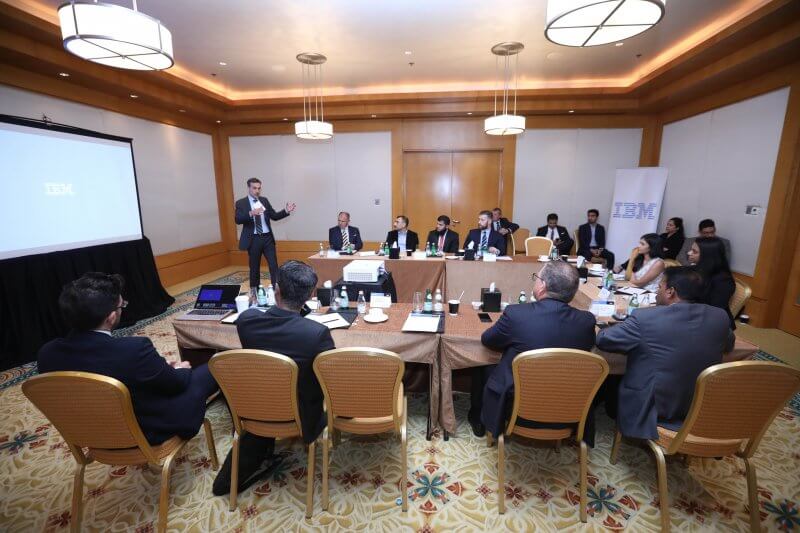 Artificial intelligence giant hosted a roundtable discussion in partnership with CNME that focused on the ways that chief financial officers can put themselves in the driving seat for their organisations’ digital transformations.
Artificial intelligence giant hosted a roundtable discussion in partnership with CNME that focused on the ways that chief financial officers can put themselves in the driving seat for their organisations’ digital transformations.
IBM’s general manager for global technology services in the Middle East, Isabel Gomez, got the day underway by framing some of the biggest challenges that CFOs face in their bid to drive technological change in the enterprise. “The challenge is being agile with budgets,” she said. “How can you reduce your costs through digital transformation? KPI’s will definitely change in the future, competition will intensify and you will have to partner more with your competitors.
“If someone told me 25 years ago that the concept of services would shift from labour to automation I wouldn’t have believed it. We now need less labour and more automation.”
Ian Fletcher, director of IBM’s Institute for Business Value, then homed in on results from the IBM’s latest CFO Study, which advocates organisations choosing to consciously self-disrupt against a backdrop of technological change.
“The Fourth Industrial Revolution has the power to change everything,” Fletcher said. “The CFO has a massive role to play in that. The Fourth Industrial Revolution is not about digital transformation, but the fusion of the physical, digital and biological. CFOs are no longer just responsible for money. They need to make decisions about where the company is going. The CIO and COO have to deal with that. The CFO is integral in deciding which projects to pursue.”
Fletcher went on to highlight how the UAE was not only part of this change, but at the forefront of it. “Dubai is, without question, ahead of the game,” he said. “It’s not behind the US. If we don’t embrace change, we will be in big trouble.”
Fletcher then discussed IBM research which revealed that just 27% of CFOs could be classed as ‘reinventors’ – those who are ready for or in the final stages of their digital transformation, where people, systems and processes are ready for change. Practitioners formed the next category with 37% of respondents, while 36% of CFOs were ’aspirationals’. “Aspirationals are already five years behind the rest,” Fletcher said. “Reinventors are storming ahead because they are agile enough to make it happen. Most reinventors segment off a third of their business to innovation. We have to think about disrupting our own businesses and governments. We’ve seen a huge increase in market share for those that have digitally transformed. I know some CIO’s who are still keeping the lights on. Digital transformation isn’t just a case of digitising your ERP, but is about having digital DNA throughout the organisation.”
IDC’s associate vice president for the Middle East, Turkey and Africa, Ranjit Rajan, then took the floor and used the firm’s research to support Fletcher’s claims around the growing importance of the CFO in driving digital transformation. He also echoed Gomez’s comments about how KPI’s will change in this new landscape. “Most organisations are at a digital transformation deadlock,” he said. “Progressive CFOs are looking at the development of new KPIs for digital transformation. “The CFO plays a key role in three areas: championing organisation-wide digital transformation, supporting and enabling IT transformation and leading transformation of the finance function. Digital transformation demands new KPIs. They could be around innovation, customer advocacy, data capitalisation, business operations or the workforce. Old KPIs do not work in the digital era.”
Rajan then discussed how other important roles were helping to drive technological change within the enterprise. “Figures such as a head of retail, marketing or a line of business are now driving digital transformation because they want to be competitive,” he said. “Budgets for transformation aren’t just going to IT. Most are either jointly for IT or the business. The CFO brings this together. The CFO manages the budgeting process and has a full view of where spending is going, and is in a unique position to bring this together. IT budgets aren’t growing in double digits, so organisations need to find the money to transform.
“Businesses need to make cost savings in the ways they keep the lights on in terms of IT. Those funds can be channelled into digital transformation projects. Digital transformation probably takes about 10 years for most organisations. CIOs in this part of world are usually tech-centric, and are more like CTOs, and aren’t as business-oriented. In many organisations, the CIO reports to the CFO. CFO’s are driving the conversation towards opex-based IT sourcing models.”
Rajan also stressed the need for organisations to carefully select their technology investments, and not simply follow the herd in opting for the latest novelty on the market. “Once one bank launches a chatbot, others feel compelled to,” he said. “Every bank in UAE has now launched one. There are a lot of vanity projects – tech for the sake of tech. Truly gauging the right experiences across channels isn’t necessarily happening.
“IT spending on digital transformation will reach the tune of $1.7 trillion per year, which is roughly the size of the Canadian economy. CFO’s need to help deliver agility, improve operational efficiencies, create new customer experiences and generate new revenue streams. They need to look at combinations of technologies, like IoT and cloud, AI and cloud or IoT and AI.”





